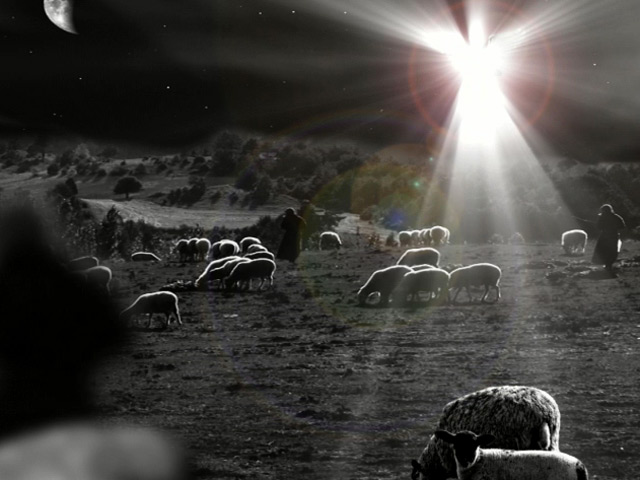The Roman census was bad news, but in the midst of such bad news, an angel appeared to a lowly group of shepherds.
Behold I bring you good tidings of great joy which shall be to all people. (Luke 2:10)
Luke wants us to ponder these competing narratives: the lesser narrative in the decree of Caesar Augustus delivering the same old bad news and the larger narrative in the angelic proclamation announcing good tidings of great joy.
It is clear that God is in control of history. Caesar’s decree brought Mary and Joseph to Bethlehem, thus fulfilling Micah’s prophecy:
But you, Bethlehem Ephrathah, though you are small among the clans of Judah, out of you will come for me one who will be ruler over Israel, whose origins are from old, from ancient times. (Micah 5:2)
God’s bigger story, God’s metanarrative, is God in control, directing the drama of the ages. Do you believe, as I believe, that God is at work in our world, at work in our lives, just as he was in the lives of Mary and Joseph, the shepherds, and Caesar Augustus? Do you believe there is indeed a bigger story, a metanarrative, behind the scenes amid both our good and bad days?
Not long ago, I conducted the funeral of a beautiful thirty-eight-year-old nurse who died after a long and courageous battle with cancer. She loved nature and God’s animal kingdom, and was fully dedicated to being a partner in the healing ministry of Jesus. What do you say when loving parents ask the age-old question: why?
I told my good friends that I did not know why God would allow their precious daughter to die any more than I know why God allowed our daughter to die. I then told them the two things that have kept my family moving forward after having faced similar heartache. We believe without question that:
- God is good
- God’s overall plan is good (regardless of our children’s death)
The biblical promise that, “In all things God is working for good” (Romans 8:28), is our lifeline, promising that in the midst of all the good and evil that we will experience in life, and in the lives of the ones we love, God is at work for good.
Some kind of narrative shapes the way we view the world and our place in it. Some story is at the core of our identity. I embraced the story of Jesus (God’s metanarrative) decades ago as my defining story, and it has made all the difference in the world. Only God knows the kind of life I would have lived had I chosen some other defining story to make sense of my earthly journey.
Calvin Miller beautifully describes what awaits those who have placed their faith in the definitive story of the risen Christ:
I once scorned every fearful thought of death,
When it was but the end of pulse and breath,
But now my eyes have seen that past the pain
There is a world that’s waiting to be claimed.
Earthmaker, Holy, let me now depart,
For living’s such a temporary art.
And dying is but getting dressed for God,
Our graves are merely doorways cut in sod.
In living through the paradoxes of life, we must be rooted in the reality of the present—but always with an eye toward the future. The Holy Spirit is forever drawing us forward, toward a time and place that is “not yet.” Our defining story, God’s metanarrative, is our shared story that will definitely have a good ending. Our earthly story may not have a good ending but God’s Bigger Story will. A good God is telling a good story that will have a good ending. Take that to the bank my friends. So, instead of just wishing you a Merry Christmas this year, let me also wish you a Merry Metanarrative, something worth celebrating every day of the year.
Richard Hipps
